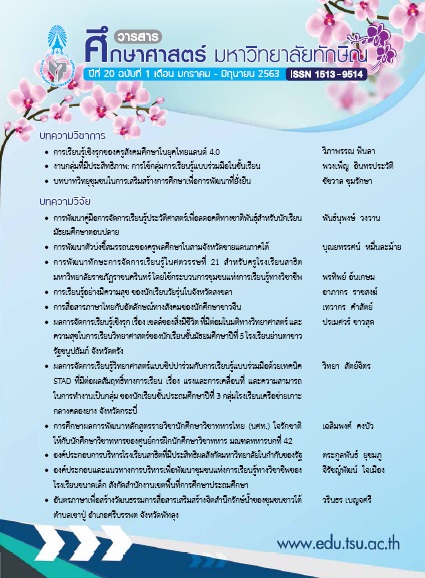งานกลุ่มที่มีประสิทธิภาพ: การใช้กลุ่มการเรียนรู้แบบร่วมมือในชั้นเรียน
Main Article Content
บทคัดย่อ
ครูในทุกสาขาวิชา ในทุกระดับการศึกษามักให้ผู้เรียนทำงานกลุ่มในชั้นเรียนเพื่อช่วยให้การเรียนรู้ดีขึ้น แต่การทำงานกลุ่มบางประเภทไม่เอื้อต่อการเรียนรู้ของผู้เรียน การทำงานกลุ่มตามแนวทางของการเรียนรู้แบบร่วมมือ มีการพิสูจน์แล้วว่าสามารถส่งเสริมการเรียนรู้ตามศักยภาพของตนเองของผู้เรียนและการเรียนรู้ของกลุ่มได้สูงสุด บทความนี้มีจุดประสงค์ที่จะนำเสนอ 4 หัวข้อ ดังนี้ การเรียนรู้แบบร่วมมือ ชนิดของการเรียนรู้แบบร่วมมือ บทบาทของครูในการใช้การเรียนรู้แบบร่วมมือในชั้นเรียน และตัวอย่างบทเรียนทีใช้การเรียนรู้แบบร่วมมือแบบการศึกษาค้นคว้าเป็นกลุ่ม
Article Details
ในกรณีที่กองบรรณาธิการ หรือผู้เชี่ยวชาญ ซึ่งได้รับเชิญให้เป็นผู้ตรวจบทความวิจัย หรือ บทความทางวิชาการมีความเห็นว่าควรแก้ไขความบกพร่อง ทางกองบรรณาธิการจะส่งต้นฉบับให้ ผู้เขียนพิจารณาจัดการแก้ไขให้เหมาะสมก่อนที่จะลงพิมพ์ ทั้งนี้ กองบรรณาธิการจะยึดถือความคิด เห็นของผู้เชี่ยวชาญเป็นเกณฑ์
เอกสารอ้างอิง
ทิศนา แขมมณี. (2552). ศาสตร์การสอน: องค์ความรู้เพื่อการจัดกระบวนการเรียนรู้ที่มีประสิทธิภาพ. (พิมพ์ครั้งที่ 9). กรุงเทพฯ: จุฬาลงกรณ์มหาวิทยาลัย.
สุมาลี ชัยเจริญ. (2551ก). แนวทางการจัดการเรียนรู้ที่เน้นผู้เรียนเป็นสำคัญ. ศูนย์นวัตกรรมเทคโนโลยีทางปัญญา คณะศึกษาศาสตร์. ขอนแก่น: มหาวิทยาลัยขอนแก่น.
Dubec, R. (2017). Cooperative Learning. (ออนไลน์). สืบค้นเมื่อ 15 กันยายน 2562, จากhttps://teachingcommons.lakeheadu.ca/cooperative-learning-101.
Johnson, D. W., and Johnson, R. (1999). “What makes cooperative learning work.” In D. Kluge, S. McGuire, D. Johnson, and R Johnson (Eds.), JALT applied materials: Cooperative Learning (pp. 23-36). Tokyo: Japan Association for Language Teaching.
Johnson, D. W., and Johnson, R. T. (2017). “Cooperation in the classroom: Towards a theory of alternative reward-task classroom structures.” Paper presented at First International Congress Educational innovation. 22 and September 23, 2017. Zaragoza, Spain
Johnson, D. W., Johnson, R. T., and Smith, K. A. (1998). “Cooperative learning returns to college.” Change, 30(4), 26. doi:10.1080/00091389809602629
Kirk, T. (2005). “Enhancing Teaching and Learning Through Co-operative Learning.” OIDEAS Earrach/ Spring, 6-34.
Schniedewind, N. and Davidson, E. (2000). “Differentiating Cooperative Learning.” Educational Leadership. 58(1): 24-27.
Smith, K. A., Johnson, D. W., Johnson, R. T. (1992). “Cooperative Learning and Positive Change in Higher Education.” In A. S. Goodsell, M. R. Maher,V. Tino, B. L. Smith, and J. McGregor (Eds.), Collaborative learning: A sourcebook for higher education. Washington DC: ERIC.
Smith, K. A., Sheppard, S. D., Johnson, D. W., and Johnson, R. T. (2005). “Pedagogies of Engagement: Classroom-Based Practices (Cooperative Learning and Problem-Based Learning)”. Journal of Engineering Education Special Issue on the State of the Art and Practice of Engineering Education Research, 94(1), 87-102.
Sharan, S. and Sharan, Y. (1992). Expanding cooperative learning through group investigation. New York: Teachers College Press.


